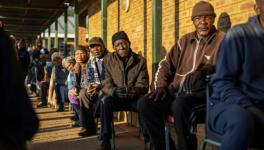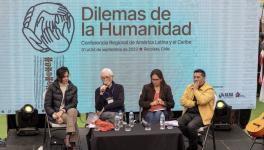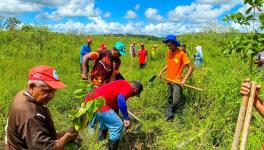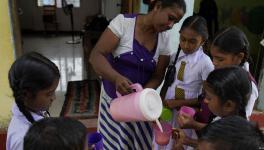Community at the Heart of Hunger Struggle in South Africa
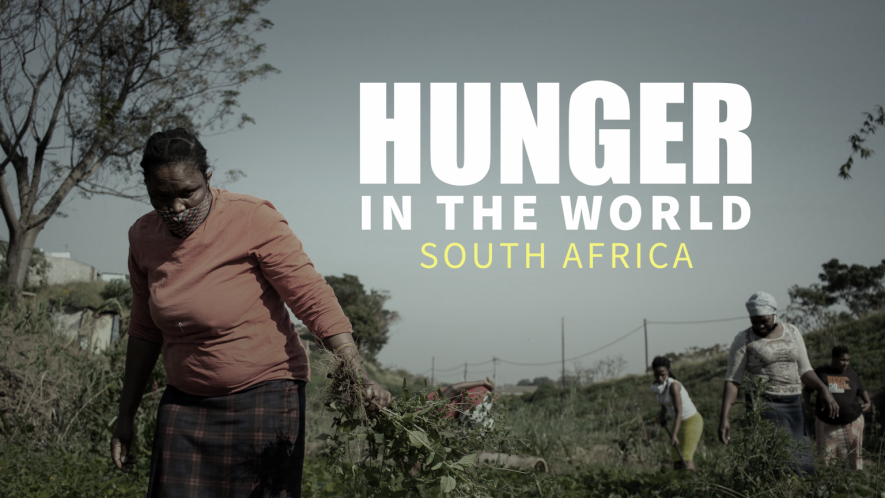
9 June 2020: Zamekile Ngwane works in the garden with other eKhenana residents. They plant a variety of seeds and the vegetables they harvest are sometimes their only source of food for the day. (Photograph by Mlungisi Mbele)
In a country where 10 million people go to bed hungry every night, the government’s COVID-19 social relief of distress grant was a lifeline. A tiny lifeline for a fraction of the estimated 28.4 million unemployed and “economically inactive” people in the country, according to researcher Siyabulela Mama, but a lifeline nonetheless.
So when the government ended the grant after just nine months, as part of its economic austerity measures, it cut more than five million people off from a monthly payout of R350 (about $23.50). Although only enough to buy a loaf of the cheapest bread each day and little else – and even though it excluded women whose minor children were already getting a child support grant of R470 a month – it kept casual and precarious workers, restaurant workers, street traders, artists and others who had lost their jobs during the pandemic from starving.
The widespread unrest triggered by a disgruntled ANC faction violently attacking delivery trucks in July quickly foregrounded hunger in the country, as thousands of starving South Africans took advantage of the chaos to loot supermarkets and food warehouses in the provinces of KwaZulu-Natal and Gauteng.
The government reintroduced the social relief of distress grant in response to the chaos, extending it to March 2022. Many hope it will convert to a basic income grant.
Mama, who works at the Centre for Integrated Post-School Education and Training at Nelson Mandela University, is a spokesperson for the #PayTheGrants campaign, which wants a basic income grant of R1 268 a month for those between the ages of 19 and 59. South Africa does not have a dole system and this age group falls outside the old age pensions and child support grants that the government offers.
Television news stations call him frequently to discuss the basic income grant and he says “over 10 million people go to bed hungry every night while living near shops with plenty of food that they cannot afford. That created a crisis. But this time the crisis exposed that the South African food system is so unjust and needs to be overhauled.”
Activists first proposed a basic income grant 20 years ago. The government has been “contemplating” it since 2002. A new generation of activists, such as Mama, is taking this campaign forward and combining it with grassroots food sovereignty projects based on communal gardens and poultry farming. Mama works with such projects in the coastal city of Gqeberha in Eastern Cape province.
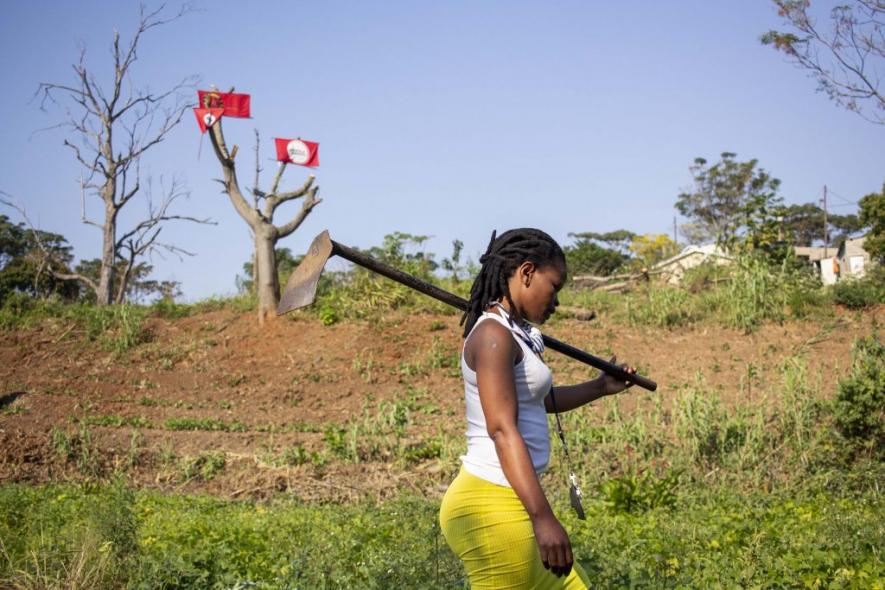
9 June 2020: Sbongile Tabhethe works in the food garden in eKhenana shack settlement in Cato Manor, Durban. (Photograph by Mlungisi Mbele)
More land occupations
Women living in the eKhenana shack settlement in the coastal city of Durban, KwaZulu-Natal, are part of a growing national trend of occupying unused land and using it for the communal production of food.
Nokuthula Mabaso, 38, says the communal vegetable garden that the members of shack dwellers’ movement Abahlali baseMjondolo established allowed them to generate enough revenue to supplement their savings of R3 000 and set up a communal poultry farm.
“When the COVID-19 lockdown was announced, we were all in financial trouble. We realized that our piece jobs [informal work] could no longer help us and our families survive … We called a meeting and discussed ways to create sustainable income for the community. We’ve made an oath to never allow anyone here to starve while there is food or money from the food projects in the community,” explains Mabaso.
The residents have about 300 Rhode Island Red chickens, commonly known as red or Zulu chickens, and a vegetable farm. “The poultry farm now helps all families struggling because we are a united community. No child in eKhenana goes to school or bed on an empty stomach,” she adds.
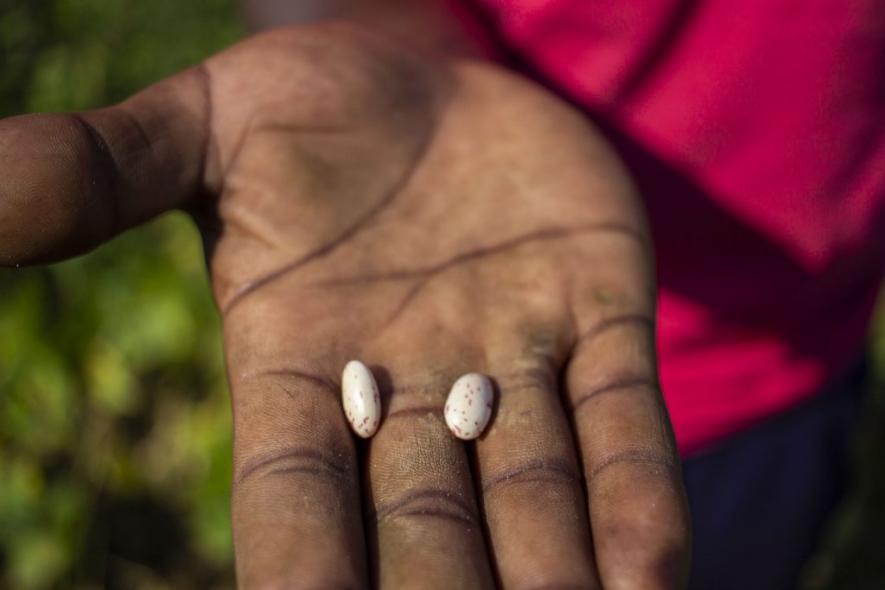
9 June 2020: Beans harvested from the eKhenana food garden. (Photograph by Mlungisi Mbele)
This is no small feat in a country where 2.2 million people lost their jobs in last year’s COVID-19 lockdown, with the result that by June 2021, Statistics South Africa put the expanded unemployment rate at a record high of 43.2%. Even the Integrated Food Security Phase Classification (IPC), a scale agreed by organizations ranging from Oxfam to USAid, recently concluded that “9.34 million people in South Africa (16% of the population analyzed) faced high levels of acute food insecurity and required urgent action to reduce food gaps and protect livelihoods”. The IPC said this number would rise to almost 12 million by June 2021.
In South Africa, the persistence of shack settlements reflects the lack of affordable accommodation options available to impoverished families in well-situated areas near public amenities. The 109 families of eKhenana occupied two hectares of land in 2018 after being evicted from rented shacks, naming their new village eKhenana because it is isiZulu for Canaan. Residents say the name represents their aspirations to transform eKhenana into a place fit for humans, with all the residents’ needs catered for collectively.
“Land occupations allow people to live on well-located land close to opportunities for livelihoods, education and to participate in urban planning and other ways of shaping the cities from below. Of course, land occupations also allow people to build homes, community halls, crèches and political schools. But land occupations are often also spaces that allow for urban gardening and farming,” says Abahlali baseMjondolo president S’bu Zikode.
The movement has been establishing collective farming projects for 13 years, the first in Motala Heights in 2008. A women’s organic community garden project, it went on to support the development of a similar garden group in the nearby eMmaus shack settlement. “This project did not only ensure that families had food, it also gave women some autonomy from exploitative and racialized forms of labor,” says Zikode.
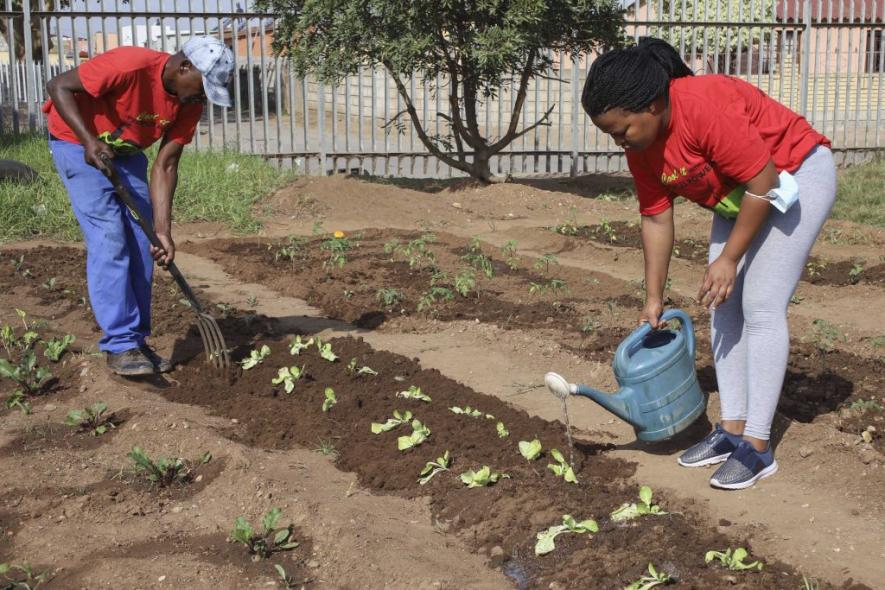
15 May 2021: From left, community farmers and Sibanye Eco-Gang activists Luthando Magavu and Nombulelo Sineke in the communal vegetable garden they helped create on unused land at a primary school in KwaZakhele. (Photograph by Bonile Bam)
Combating multidimensional poverty
The Eastern Cape is the second-most impoverished province in South Africa. Recently, 78.7% of children living here were found to be in “multidimensional poverty”. This means not only are the adults unemployed and without an income but the family as a whole has no vehicle, no way to obtain food, cooking fuel, electricity or clean drinking water, and lives in a home that is not weatherproof, lacks basic appliances and has no sanitation.
The COVID-19 pandemic and lockdown marked a resurgence in working-class efforts to produce food on unused land in the province. In Gqeberha, 10 activist food gardens have taken off on reclaimed land and the grounds of public schools and clinics. Under colonialism and apartheid, the most fertile and well-positioned land was set aside for white people. Black townships were established on land that is difficult to farm.
“It takes tremendous effort for people to create healthy soil out of marginal land. It is very hard work,” says Mama. He works closely with Sibanye Eco-Gang, a group of activists and former trade unionists that is reclaiming marginal land in KwaZakhele, a township established in the late 1950s to accommodate Black South Africans forcibly removed from Korsten near the city center.
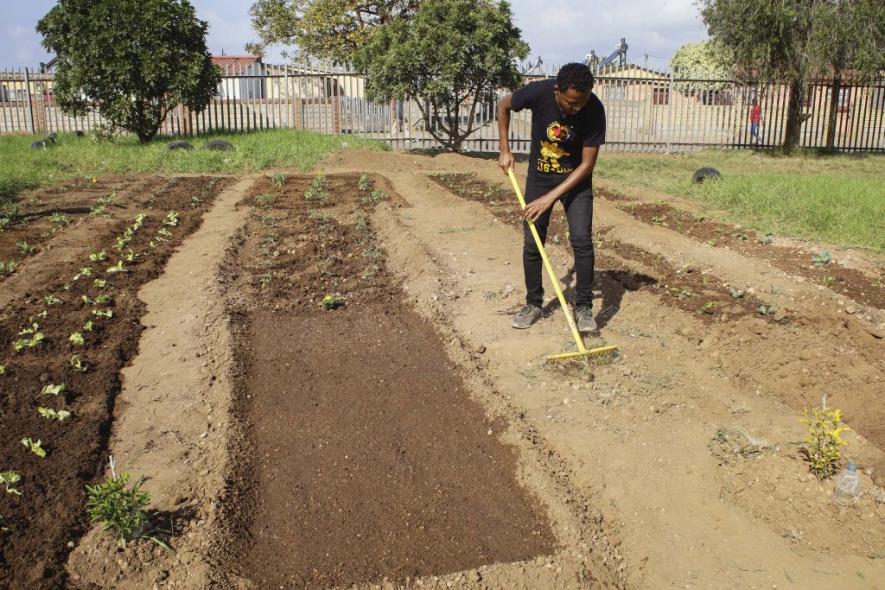
15 May 2021: Siyabulela Mama supports more than a dozen community farms in Gqeberha. (Photograph by Bonile Bam)
Roger Mafu, 45, was retrenched from General Motors two years ago. He has been a full-time, unpaid community activist in KwaZakhele since then and is an active member of Sibanye Eco-Gang.
“Working in a place like that is modern slavery anyway. So I was not disappointed by my retrenchment,” says Mafu. “Politically, these are disadvantaged areas. There is a high rate of unemployment and poverty. So, I decided during the lockdown that why don’t we mobilize and start gardens? People who are educated call it food sovereignty.”
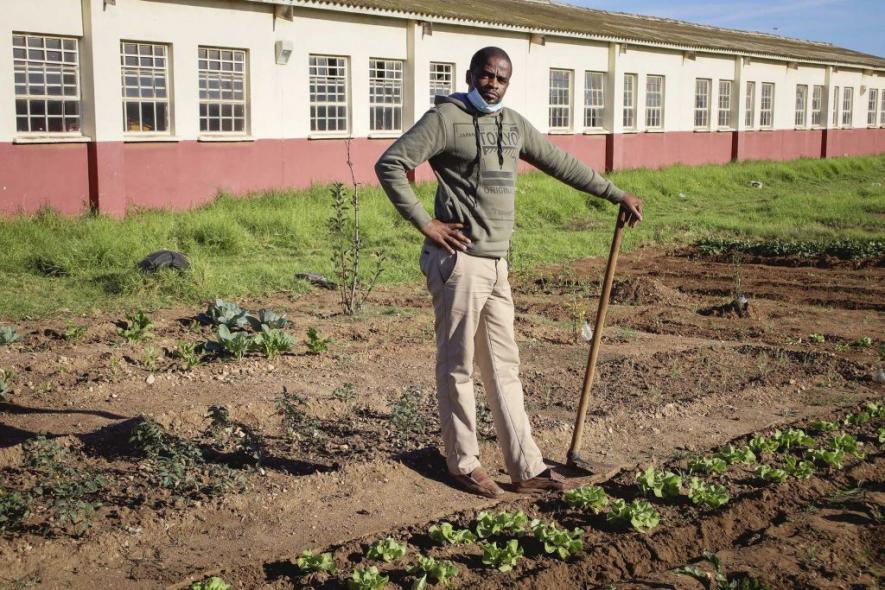
29 May 2021: Roger Mafu is an activist in Sibanye Eco-Gang, which reclaims unused public land in KwaZakhele. (Photograph by Bonile Bam)
Sibanye Eco-Gang has organized some of the gardens on small squares of empty land that used to house the “gap taps” favored by the apartheid regime. These single taps each served 36 Black families who had no running water in their homes and had to line up to collect water in buckets.
Mama says the use of gap taps ended when low-cost housing was built after the end of apartheid and the patches of land they stood on became informal, hazardous dumping sites. “When the hard lockdown came, we saw an opportunity to change those dumping sites into community gardens. This was done through a number of community meetings with everyone in the area … Those who are interested now meet every weekday at 8am to see what needs to be done in each garden.”
Food is provided to everyone from these gardens, whether they can pay for it or not. “This is an understanding that only social markets can have, that people may not have money immediately. Food is first and foremost a source of nutrition and only secondarily an item for trade,” says Mama. The various gardens hold assemblies every two months, to bring members together to share and protect traditional knowledge of food production. When valuable crops such as sweet potato cuttings are sourced, it is at the assemblies that a democratic decision is made about how to share them.
Because they are reclaiming marginal land for political purposes, the activists don’t view themselves as gardeners.
“We have come to see this work not as gardening, a word in English associated with middle-class leisure, but with the hard work most often performed by the working-class men whose labor has been marginalized and racialised in our society. This word, ‘gardener’, we would like to suggest, erases the socially useful work of livelihood food production … It is the isiXhosa term ukulima (to farm) and abalimi (farmers) that people involved in community farming refer to themselves and their work as,” says Vuyokazi Made, 35, a farmer with the Amandla Collective in Kwadwesi Extension, a few kilometres from KwaZakhele.
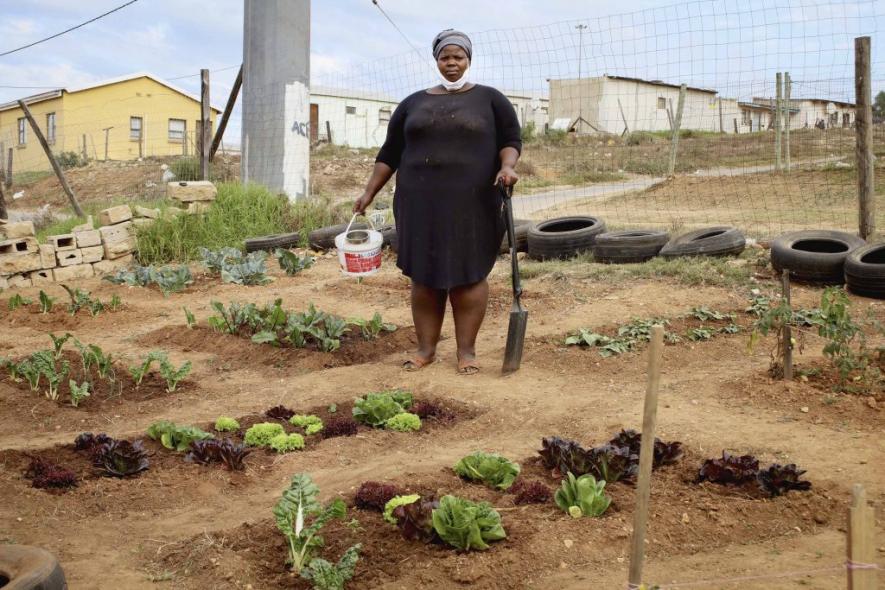
16 June 2021: Amandla Collective community farmer Vuyokazi Made in her personal backyard vegetable garden. (Photograph by Bonile Bam)
Political organizing with food sovereignty
On the other side of the city, the Zweledinga shack settlement of just 400 people is combining political organizing with food sovereignty projects.
When the COVID-19 pandemic began, the residents knew that the long-promised development of their area would be put on hold, so they tapped into the electricity supply for the affluent neighboring suburb of Seaview. When the Nelson Mandela Bay municipality disconnected their supply a few months later, they felled an enormous tree to block the road, cutting off access for the wealthy residents. This led to Zweledinga’s electricity being reconnected.
The settlement has been highly organized for the past 30 years, since its residents occupied public land. A democratically elected citizens’ committee organizes strikes. The committee includes three representatives of the garden subcommittee, which oversees six gardens in the settlement that provide spinach, carrots, beetroot and cabbage for all residents and houses goats.
“Politically, we are advocating for more taps. We have only three communal taps for all our families to fetch water from, and sometimes all three taps have no water. Then we basically experience a drought,” says garden subcommittee member Welile Gonqoba.
“We are also planning another political action to demand houses. We are going to close the road like we did last time. It was because of that political action that the municipality provided us with electricity,” he adds.
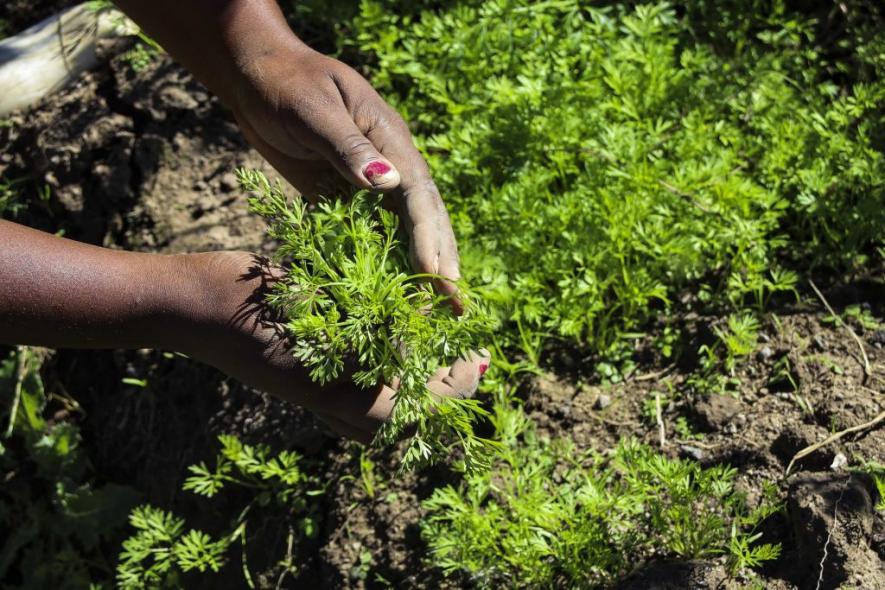
17 April 2021: A volunteer prepares a carrot plant on a seed-saving plot at Elundini Backpackers. Along with permaculture activists, they have been experimenting with sustainable methods for rural communities to source land, seeds and water. (Photograph by Bonile Bam)
Socialist Ntsika Mateta, 31, hopes to expand the movement by piloting communal and backyard permaculture gardens in rural villages, and supporting urban projects to set up seed banks and protect and grow indigenous medicinal plants. Mateta is the coordinator of the Eastern Cape Water Caucus, an umbrella organization for about 40 communities affected by water and food shortages and high water bills.
He recently took the unusual step of relocating to a remote village of just 200 families, Elundini, about 30km from the university town of Alice in the Eastern Cape. Elundini, built on a steep and rocky hillside, was founded in 1986 after the apartheid government forcibly removed hundreds of Black people from much better land about 20km away, which was then turned into a dam. “People were just put into bungalows by the apartheid government and left here without water,” says Mateta.
He has been offered 10 hectares of land owned by Eco-hostel Elundini Backpackers to farm and has started by establishing an experimental permaculture garden with more than 50 different types of vegetables, herbs, indigenous medicinal plants and berries. In this garden, Mateta tests useful farming techniques that do not require a lot of money, such as no-dig and waterless farming. This pesticide-free garden produces organic seeds that are grown into seedlings in a greenhouse constructed from recycled materials.
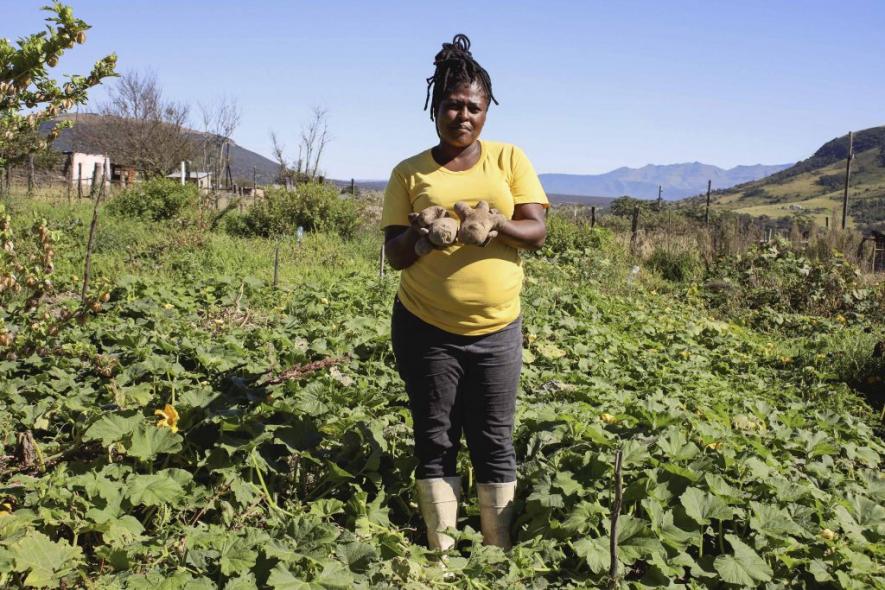
17 April 2021: Akhona Kobese, 30, with potatoes harvested from the communal permaculture garden on land provided by Elundini Backpackers. (Photograph by Bonile Bam)
“We saw the need to build more food resilience when the COVID-19 pandemic hit. The food relief from the government [mainly small hampers of processed, white carbohydrates with little protein or vegetables] failed our people. The most important thing was to form a collective commons so that people can take ownership of their welfare. We are trying to make a localized circular economy here because we are far from the town, and we don’t want people to waste money on traveling to buy food.”
On the recent unrest and looting of food, Mateta says “”rising food prices, price-fixing by corporate food manufacturers and the fact that food is inaccessible to the majority of us clearly show that the entire food system in South Africa is broken”.
Like the food sovereignty groups in Gqeberha, 250km away, Mateta consults village committees and conducts workshops with villagers to motivate them to expand the project.
“People here grow only mielies and potatoes, so they don’t see vegetable farming as a reliable way to feed themselves. People are used to using pesticides.” But now, from the experimental garden, villagers can harvest pesticide-free vegetables and more rare food items such as dandelion, berries, clover and other wild plants, which offer nutrition in the form of salads.
“There is a lot that can thrive here. We just need to experiment first and see what works. My philosophy here is if I give you five seeds this season, then next season you must give me 50 seeds. That is a good way of expanding our movement.”
Mateta says the farming project has become an important organizing tool as “people here are depoliticized and alienated from what is happening both nationally and on the continent and in the rest of the world. The political system that holds the reins is an anti-human system that shows no respect for the environment or the people.”
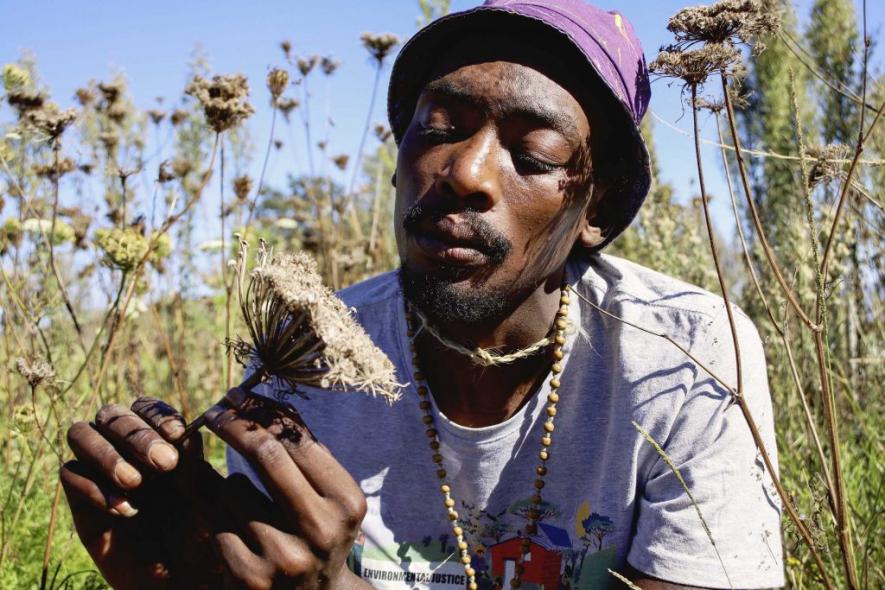
17 April 2021: Permaculture activist Ntsika Mateta from Ngqwele village near Qonce in the Eastern Cape holds a carrot plant he is using for seed production to support rural residents in establishing communal and household vegetable gardens. (Photograph by Bonile Bam)
A long-term aim expressed by these urban and rural farming groups is to establish democratic grassroots farmers’ assemblies that meet regularly and connect with the workers’ movement, bringing food sovereignty into everyday working-class organizing.
Collective food sovereignty projects are not the norm, though, and it will take time for them to spread to other impoverished areas. In the meanwhile, the basic income grant appears to be the only way to stave off mass hunger in South Africa.
But Mama cautions that for the grant to succeed, it is essential that it be devised by “the unemployed, women and precarious workers. The government must consult and talk to the people that it is meant for. It cannot be the product of discussions with NGOs [non-governmental organizations] and technocrats.”
Hunger in the World is a collaborative series produced by ARGMedios, Brasil de Fato, BreakThrough News, Madaar, New Frame, NewsClick and Peoples Dispatch.
Get the latest reports & analysis with people's perspective on Protests, movements & deep analytical videos, discussions of the current affairs in your Telegram app. Subscribe to NewsClick's Telegram channel & get Real-Time updates on stories, as they get published on our website.










